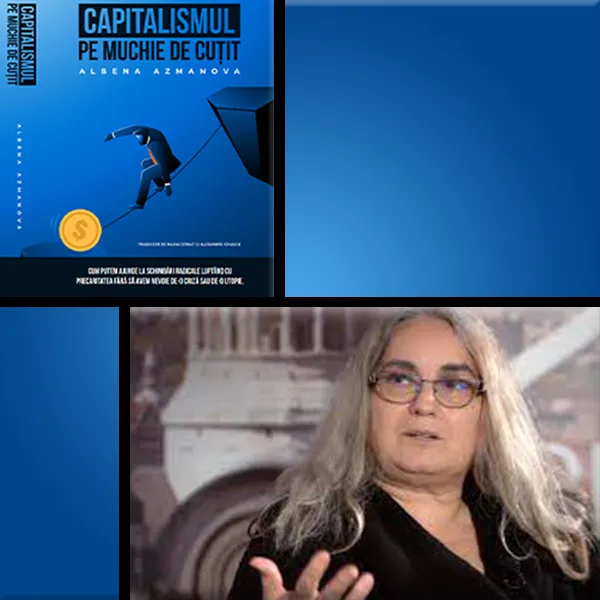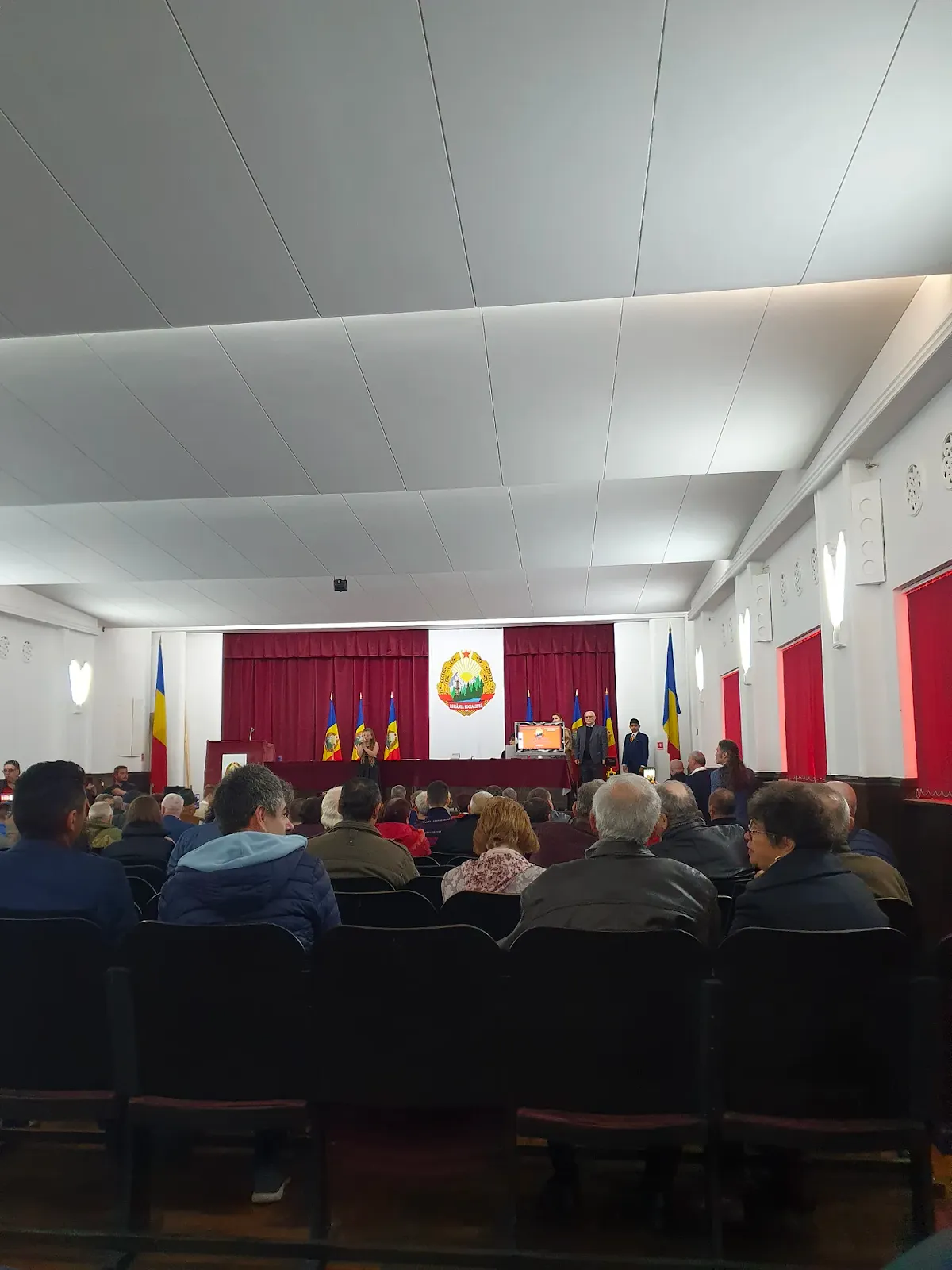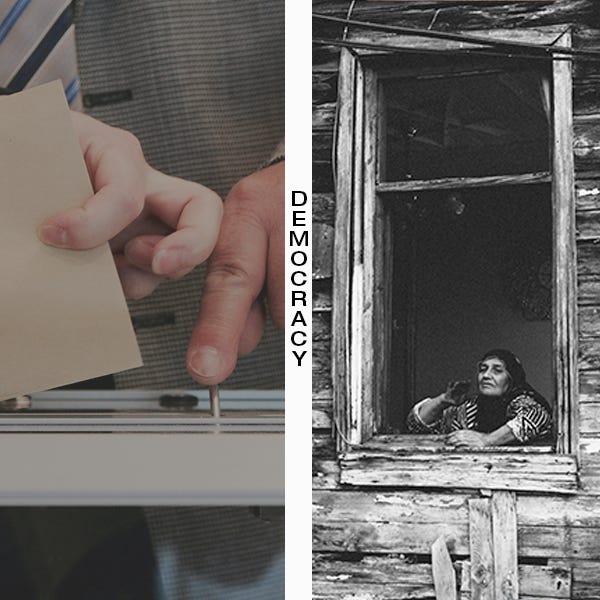Mentally and materially, capitalism creates us in such a way that we cannot imagine overcoming it. If we do imagine it, we cannot overcome it without being pushed towards violent actions against it.
Thanks to Albena Azmanova for the book and to Maria Cernat and Alexandru Ionașcu for the translation, which now gives us the opportunity to talk in Romania about capitalism and how to overcome it. Of course it would be good to discuss each chapter individually, but as we don’t have time for that, I thought of choosing three major themes from those treated in the book, in order to bring them closer to the Romanian context, but also to the subject of the political activism of the Social Housing NOW! movement in Cluj or of the Bloc For Housing, of which I am also a member. I do this by introducing some examples from the field of housing in my arguments, why housing is central to capitalism, or how to think about solutions to the housing crisis that would have the potential to go beyond capitalism.
I very much appreciate the author’s analytical approach to the end and the idea of making some proposals on the most important measures we need now. Albena tells us that the recent phase of (post-neoliberal) capitalism could be called a capitalism of precarity, precarity being a complex phenomenon with many dimensions such as insecurity, dependency, powerlessness, political disorder, economic austerity, and fear of change. She argues why we should focus on eliminating precarity. Because, she says, eliminating precarity would create a societal state in which we would all have more time and more courage, work less under the pressure of productivity and thus have the opportunity to think about an alternative to capitalism.
In this book Albena Azmanova talks about overcoming capitalism without revolution and utopia, which I personally believe is not possible. But if we read the book to the end, we realize that the author is actually looking for intermediate solutions to create this state in which we can afford and have time to think about an alternative to capitalism without fear. And this intermediate state would be possible without revolution and utopia – at least that’s how I understand her argument. But I would just like to suggest that, in fact, from the moment we think about measures to overcome capitalism, even to create the intermediate state that creates the conditions to think further about it, we need certain political visions, utopian or not. Because (even) the elimination of precarity is not achieved by purely technical policies, since policies are instruments of politics, and politics is informed by visions and ideologies. And I would add that to think about radical change in its materiality, one needs to think about the possibility of the working classes taking control of the means of production. And we can hardly imagine this happening by seeking an amicable consensus with capital which, by its very nature, cannot function otherwise than by continuous exploitation and dispossession, which is only possible because of private ownership of the means of production.
But let me now focus in a little more detail on the three themes announced.
The constitutive dynamics of capitalism
The first theme I want to talk about here is the constitutive dynamics of capitalism, or the constitutive factors of capitalism on which we should act if we want to overcome capitalism. Out of a number of factors, Albena decides to focus on the competitive production of profit. Of course she does not completely neglect the other two aspects, such as private ownership of the means of production which make exploitation possible, nor the basic logic of capitalism which is the accumulation of capital. She decides, rather, to focus on the harmful effects of competition for profit, and to ask what could be done to eliminate this feature of capitalist society.
A major problem is that this, let’s call it, ‘spirit of capitalism’ (as the author wants to re-introduce Max Weber next to Marx into the analytical landscape to understand what is going on with capital accumulation), well, this spirit of competition for profit is extremely difficult to eliminate. Why? Because it somehow permeates the whole fabric of society, not just economics, not just politics, but the way we ordinary people live our daily lives. To understand this, we need to remember that Albena is talking about relational domination, systemic domination and structural domination within capitalism, which all together make this drive for competition for profit not just the distinguishing mark of the productive and non-productive economy, but a principle that all institutions impose on us in all areas of life. The market, state institutions, school education, the media, everyone wants to teach us to be competitive, to be efficient, to make a profit because that is how we prove our entrepreneurial capacity, which is the analogue of success in capitalism. And then what happens as a result of this is basically a victory of the state in collaboration with capital, because we internalize this, trying to get closer to the capitalist ideal of man. So the structural becomes systemic, and it becomes difficult not only to live differently, based on other principles, but to even imagine another society. In a different kind of society we would all operate on a different basis and not on the basis of competitiveness for profit. The state would put the needs of society, and not those of capital, at the top of its political agenda.
I was saying that I am trying to bring the themes discussed closer to the housing issue, and here it is best to give an example to fill in this abstract explanation. In today’s Romania we have a lot of homeowners. The private sector, through real estate developers, banks and investment funds, not only produces housing while the state hardly produces at all, but also trades and speculates housing. And through all the mechanisms they control, these actors also create the housing crisis which is manifested, among other things, in the reduced affordability of housing or, in other words, in the exorbitant housing prices, from which the profit goes into their pockets. But beyond the latter, who dictate what happens on the housing market and are the winners of these processes, ordinary people, the low-income and even in some cases poor, who have a home, are also trying to make their homes worthwhile on the market, i.e. to use them for their exchange value. Thus, this system of capital accumulation through the production and trading of housing for profit becomes internalized in everyday life. Of course, we understand the motivations of ordinary people who use their rented housing as a source to supplement their low incomes, salaries or pensions, but we must therefore observe how this mechanism interweaves the whole societal structure, and how the generalization of competitive production for profit is also seen in this question of housing.
In the book the author refers to David Harvey, the critical Marxist geographer, and others who further provide pointers for the critical analysis of capitalism from the point of view of housing, noting how housing becomes, as part of the built environment, a source of capital accumulation, forming the secondary circuit of capital. This is why it needs to be rethought through visions that offer alternatives to capitalism. On the other hand, however, this is precisely why it is so difficult for us, as political activists fighting for housing justice, to change anything in housing policy. In trying to claim some rights and measures that increase the stock of public social housing, we realize that this is not possible since the way housing and housing policy works is part and parcel of contemporary capitalism. And for housing to change and no longer depend on this profit logic, the whole system needs to change. This is also where my personal attempt to connect housing justice activism with broader critical thinking about capitalism and alternatives to capitalism, which we try to cultivate in the informal group Socialist Vision (VIS).
The crises of capitalism
The second theme developed in Albena’s work that I would like to talk about concerns the crises of capitalism. I think that here we are dealing with one of the major challenges of the analysis, because the author tells us that there is not a crisis of capitalism, but a crisis of the crisis of capitalism. My understanding of this issue, or what I would propose on this subject, is that we must recognise that, in fact, the crises produced by capitalism in a cyclical way are not a crisis of capitalism because they are always resolved by solutions that save capital from crisis. Each crisis is resolved in a way that sustains capital (but also the contradictions of capitalism), and therefore creates the conditions which then make it possible for the next crisis to explode.
The crisis of the 1970s (the end of state capitalism) created more opportunities for the accumulation of capital through the establishment of neoliberal capitalism, which liberalized the movement of capital across state borders, applied market principles to all areas of society, and transformed the state into one totally subordinate to capital. Then, the financial crisis of 2008-2009 created by neoliberalism and credit-based economics was solved by bailing out the banks and the financial sector. And this has contributed to the continuation and deepening of the financialization of capitalism in all economic sectors, i.e., the transformation of goods and services into assets in which investments can be made, and the domination of the financial players who are spidering the productive economy, as well as real estate development and housing production. As for the current energy and inflation crisis, also produced by capitalism, we see how the state does not want to find any solutions to them other than those which subsidize private energy companies or, through monetary policies, allow banks to increase their profits. Returning to examples from the housing sector, we see how, faced with rising interest rates on mortgages, property developers and investors are now starting to think of solutions that will save them, believing that they now need to go more in the direction of producing housing for rent. And the state in turn will help them. It will not think that its response to the current housing crisis should be to build more public housing for social rent, but instead through government programmes to support private real estate actors in the production of private housing for market rent.
So the problem is, I argue, precisely this relentless mechanism of producing and resolving the crises created by capitalism in favour of capital. Thus, the question about the possible overcoming of capitalism becomes how exactly we can escape from this logic, how we can seek solutions to the crises created by capitalism not by saving capital, but by putting them at the service of labour and all those who suffer all kinds of disposession.
Speaking of Central and Eastern Europe, after thirty-odd years of capitalism, we must also re-examine the crisis of capitalism in the 1980s. And we must ask ourselves, how did Romania become part of global capitalism again after 1990 (having been part of it before, but differently)– and how was it that all the economies of state socialism had to collapse in order to create new possibilities for the revival of Western capitalism? Why did global capitalism need the collapse of socialism, be it in the form of state socialism? Speaking of state socialism … here I would see an important source from which we should start when looking for alternatives to capitalism. As a proponent of seeking alternatives to contemporary post-neoliberal capitalism in the direction of internationalist socialism, I am trying to think of an alternative that is based both on a critique of capitalism and a critique of state socialism. The latter, in the context of global capitalism, has defeated itself. The state owning the means of production has decided to self-destruct and create the private sector and spaces for capital accumulation. This is where we should start the critique of this system, to understand why and how it happened, and what an alternative socialism should look like, in which this does not happen. Even if this is not a central theme of her book, Albena does make some criticisms of pre-1990 socialism in countries like Bulgaria and Romania, but she does not address what I have emphasized above. That’s why I wanted to bring these ideas to the fore as an addition. Nor does the author address the question of whether or not it is possible to achieve socialism, or to overcome capitalism through another regime in a single country, or in a bloc of countries; of course, this is an old theme for us too. The collapse of state socialism in the 1990s shows us that this is not possible, and is becoming less and less possible because of the interdependencies between countries in contemporary global capitalism. The war in Ukraine is a laboratory, unfortunately, where we can see this fact that today’s capitalist system needs wars in order for the interests of the great powers to re-divide the shares of the world.
The possibility of overcoming capitalism
Thinking about the possibility of overcoming capitalism, Albena tells us one more very important thing: capitalism manages to perpetuate itself, in spite of, or even through, crises it produces (as we have seen above). It does so because it is able to keep people’s discontent under control. It would therefore be necessary for these grievances to be made politically aware, to manifest themselves in public, to be put on the political agenda of decision-makers. But as history shows, this does not seem to be possible peacefully. Personally, I do not believe that the state, in its current form, transfigured in the image of neoliberalism, is willing to rethink the ‘legitimacy agreement’ (as Albena defines the relationship of legitimacy between citizens and authority) in the direction of opening up to peoples’ grievances expressed through demonstrations in which they have to impose themselves face to face with the forces of order of this state. If peoples’ grievances are exposed to the forces of law and order, the agreement in question cannot be peacefully rewritten.
Dissatisfaction with today’s rising cost of living, which is due to the rising profits of private companies in the energy sector and all other economic sectors where prices are spiraling, should force us to go beyond capitalism. But will the state agree to do this, i.e., will it get out of its cahoots with capital and find solutions to this crisis that do not suit capital? Will the state agree, for example, to socialize the private companies that it rescues through subsidies and state aid, i.e., to grant them this aid on the condition that the owners of the companies hand over the assets of these companies to the workers at least to the extent of the percentage that they enjoy in subsidies from public money? Will the state agree to build social housing from public funds instead of offering support to private actors who want to continue building for rent, as an alternative to the model of homeownership that has prevailed in Romania until now, but which has entered a crisis due to the rise in bank interest rates? Will the state agree to support people who are unable to pay their bank repayments instead of letting the banks evict them and then letting investment funds buy up the bad loans and these low-cost homes, opening up new avenues for speculation in the housing market? Will it do all this without popular pressure reaching disturbing heights, under which it will not be able to continue the old story of saving capital from the capitalism-produced crisis?
Albena proposes solutions for overcoming capitalism, or at least for overcoming precarity as a condition for thinking about overcoming capitalism, which seem attractive. But I would allow myself to rename them, noting some of their limitations.
One of the proposed solutions is emancipation without utopia. But I wonder, can emancipation from exploitation, subordination and dispossession be done without a vision that actually charts the direction of emancipation?! Personally, I don’t think there is emancipation in the abstract. Emancipation is a form of (self-)awareness that opens up the potential for action for change, while also creating the subject of action freed from the mental and economic yoke of the power structures it rebels against. And change must be material and in a certain direction, for which it needs vision. Utopia, if you like, since any vision seems utopian when the state-capital enmeshment has been so deep and for so long, fixed for the purposes of mutual aid that successfully saves capital on the occasion of any crisis of capitalism. I think we should be able to dream precisely what seems impossible, because systemically and structurally capitalism creates us in such a way that we cannot imagine overcoming it. And if we do imagine it, we cannot overcome it without being pushed towards violent action against it.
Another issue discussed by Albena apropos of emancipation is the proposal to put emancipation first and to criticize the demands of justification. In a way, this is the equivalent of pitting emancipation against justice. Personally, I see them as intertwined, but of course it also depends on what is meant by justice, and what struggles for justice we mean. For us, as political activists for housing justice, justice means socio-economic justice, creating a housing regime that is removed from the influence of the market, capital accumulation and competition for profit, by regulating the housing market and producing a significant amount of publicly-funded social housing that would be managed by tenants and does not end up feeding the market. Further, for us, for me, thinking about such claims presupposes the existence or at least the co-creation of the claiming subject, which is a political subject that emancipates itself while formulating these claims, and formulates these claims while emancipating itself.
Another solution that Albena believes would be necessary to combat precariousness is that of political solidarity among all precarious people. The book makes several arguments for seeing insecurity and dependence, or lack of power to change anything, or fear of initiating change as a feature of life in many social groups. But the precariousness of the poor and low-income and the precariousness of the higher-income is not one and the same. There is an inequality between the precarious – precariousness in the broad sense of the word affects us unequally. Assuming that some kind of solidarity would be established between all the precarious, this would run the risk that the more privileged precarious, i.e. the relatively privileged compared to the poor precarious, would dominate the definition of common demands, which would not necessarily reflect the grievances of the poorest or the racialized social categories.
Personally, I think it would be desirable to build political solidarity against capital. So I would not give up the class struggle in favour of (self-)organisation of the 99% against the richest 1%. This requires, among other things, an awareness that the different ways in which capital exploits and dispossesses different working classes are in fact interlinked, and they together perpetuate capital’s domination over all. The latter is also made possible by the ability of capital, and the state that serves it, to manipulate the differences between the working classes and the working classes themselves by creating antinomies between them through appeals to ideologies of meritocracy and competitiveness or of criminalization and racialization of the poor. Returning to the housing example. I believe that political solidarity for the creation of a significant public housing fund that weakens the power of the housing market and goes against the interests of capital invested in housing development is weakened precisely by the symbolic and material creation of working classes with greater purchasing power, but indebted through private rents or bank installments, and their contrast with low-income workers who are stigmatized for needing social housing, while the latter also become stigmatized in such a way that they seem not to be desired by the many.
To talk, as Albena does, about the possibility of undermining capitalism by using the institutions of liberal democracy is to have any faith in those institutions. This is despite the relatively recent history in Romania, when any political party would have been in power thanks to the democratic vote, and what has happened was and is the gradual privatization of all areas (from industry and agriculture, through services and housing, to energy, with tendencies towards education and public health) and the liberalization of prices that reduces the lives of more and more social categories to day-to-day survival. Albena makes some concrete proposals to the European institutions, for example the creation of a European Sovereign Wealth Fund that would function as a trans-European social insurance system, and a European Social Stability Mechanism, which fall under the spectre of trust in the institutions of liberal democracy and the peaceful change of capitalism. But can we still trust a redesign of the European Social Model, which has been perpetuated for decades, without also solving the big social problems in the Member States, such as poverty or the widespread accessibility of adequate housing or all kinds of inequality? Certainly hardly, especially if the neoliberal European Economic Model does not change in other directions besides a return to national capitalisms.
I agree that the fight against precariousness is important, as is the creation of broad political solidarity, but I argue that it should be fought alongside the fight against inequality, which must ultimately be a class struggle. For my part, and I am certainly not alone in these views, I would like to conclude by saying the following. During the pandemic I really thought that the state had learned that society needed massive public investment in public services, including housing and health, and began to exercise active involvement in the market (through state aid) on its face. But then we very quickly saw that this was not happening. On the contrary, the weakened population was hit towards the end of 2021 by government decisions that liberalized energy prices, increased investment in militarization or increased bank interest rates. That is why I can no longer believe that the (capital-controlled) state, through the institutions of liberal democracy, will want to have structural solutions to the current crisis that will support the exploited, dispossessed, poor, precarious people, or will have solutions to the climate crisis outside of greening sectors of the economy that make profit for capital. If generalized discontent does not coalesce into a class struggle against the state-capital pair, starting perhaps by gaining control of state institutions, the risk is that it will be channeled in the direction of the nationalist right and will exhaust itself in futile struggles against immigrants, Roma, LGBTQ, or in wars between nation-states in which the great imperialist powers actually clash in order to create a new world order.
This text was originally published in Romanian here.
The Barricade is an independent platform, which is supported financially by its readers. If you have enjoyed reading this article, support The Barricade’s existence! See how you can help – here!
Also, you can subscribe to our Patreon page. The Barricade also has a booming Telegram channel, a Twitter account and a YouTube channel, where all the podcasts are hosted. It can also be followed in Rumble, Spotify, SoundCloud and Instagram.











